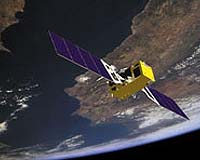 |
Brussels (AFP) June 29, 2009 The EU's much delayed satellite navigation network project Galileo has been ill-prepared and badly managed, the European Court of Auditors charged Monday. "The programme lacked a strong strategic sponsor and supervisor: the (European) Commission did not proactively direct the programme, leaving it without a helmsman," the auditors' court opined after carrying out an audit of the ill-starred project. As well as the commission -- the EU's executive arm -- the 27 member states came into criticism for promoting their own industries first and foremost. "Owing to their different programme expectations, member states intervened in the interest of their national industries and held up decisions. The compromises made led to implementation problems, delays and, in the end, to cost overruns," the official auditors declared. The 30-satellite network is meant to challenge the dominance of the US-built Global Positioning System (GPS), which is widely used in navigation devices in vehicles and ships. The EU aims to have it up in space by 2013. The EU has struggled to secure financing for the project's budget, originally 3.4 billion euros (5.4-billion dollars) -- and has had to release unused funds from the bloc's massive agricultural budget. The audit examined the factors in the failure of the concession process and for delays and cost overruns of technological development. It concluded that the original public-private partnership plan was "inadequately prepared and conceived" not to mention "unrealistic". The Galileo Joint Undertaking -- a body set up in 2003 and scrapped in 2006 -- was given the task of supervising Galileo's technological development activities but "was seriously constrained by governance issues, an incomplete budget, delays and the industrial organisation of the development and validation phase," the report said. If the Galileo project is to succeed, the European Commission "must considerably strengthen its management of the programmes," the Court of Auditors said. "Finally, should the EU resolve to engage in other large infrastructure programmes, the commission must ensure it has access to the appropriate management tools," it added. The report makes grim reading for the European Commission not least because the Galileo programme was the first of its kind. "We acknowledge that there were delays and cost overruns," a European Commission spokesman said. "In hindsight things could always be done better... but we are happy to accept the recommendations of the court in order to be able to get on with the project," he added. While unable to quantify the cost or time overruns, he said the first operational satellites should be launched next year. The auditors' report said that the stalling of negotiations with private sector companies in 2007 means "technological development has been set back five years". While test satellites have been launched none of Galileo's 30 operational satellites have been put in space yet. The project was the first close collaboration between the European Space Agency (ESA) and the commission on such a large space programme, the first industrial programme to be managed at European level and the first time the commission was to participate in a public private partnership scheme. Share This Article With Planet Earth
Related Links GPS Applications, Technology and Suppliers
 ESA, Arianespace ink contracts for Galileo launch
ESA, Arianespace ink contracts for Galileo launchLe Bourget, France (AFP) June 15, 2009 The European Space Agency (ESA) and launch company Arianespace on Monday said they had signed a contract for the launch of four testbed satellites in Europe's Galileo sat-nav system. The satellites will be launched in pairs by two Russian-made Soyuz launchers from ESA's space centre at Kourou, French Guiana, in the second half of 2010, they said. Financial details were not given. ... read more |
|
| The content herein, unless otherwise known to be public domain, are Copyright 1995-2009 - SpaceDaily. AFP and UPI Wire Stories are copyright Agence France-Presse and United Press International. ESA Portal Reports are copyright European Space Agency. All NASA sourced material is public domain. Additional copyrights may apply in whole or part to other bona fide parties. Advertising does not imply endorsement,agreement or approval of any opinions, statements or information provided by SpaceDaily on any Web page published or hosted by SpaceDaily. Privacy Statement |